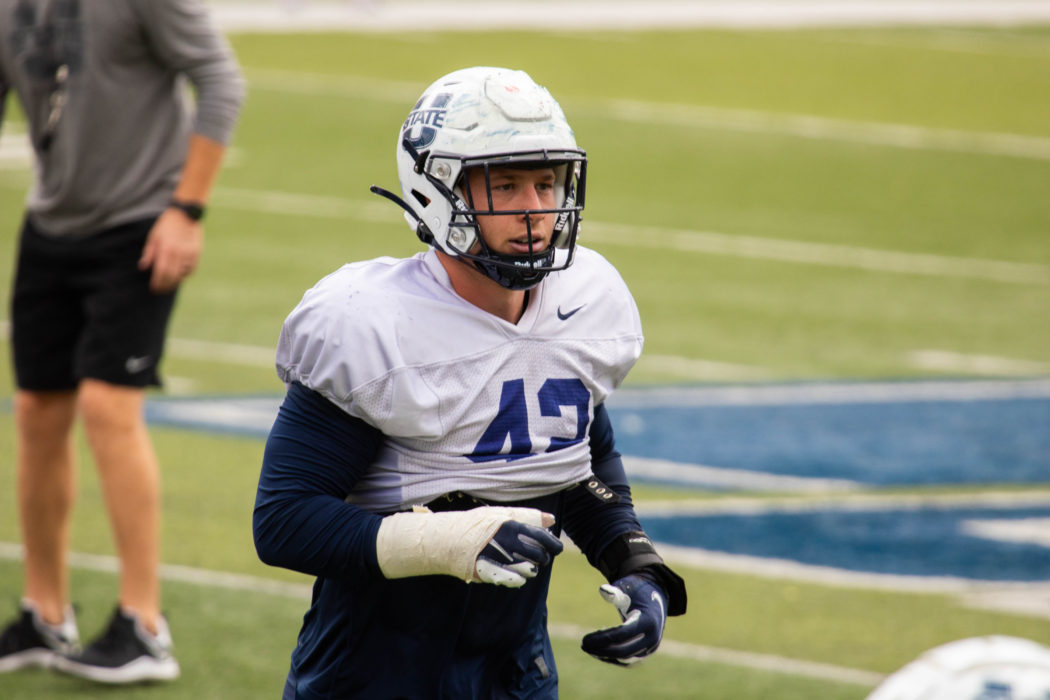‘Growing Doesn’t Come without Failure’: Lessons from an Academic All-American
As featured in the 2021 Football Preview Magazine
On May 5, senior Nicholas Heninger won the Joe E. Whitesides award —given to Utah State University’s best academically performing student-athletes. Two months later, Heninger became an academic All-American. He is only the eighth USU football player to do so. And these are only the latest of awards to make it to the grad student’s trophy case.
Waqa Damuni, an assistant athletics director, said Heninger was the first person to come to mind to nominate for awards and “makes our job easier” in choosing student-athletes for award season.
“He’s a strong student, great player and great kid,” Damuni said.
But not only has Heninger seen success in the classroom, he backs it up on the field too. Despite only playing in six games in the 2020 season, the defensive end recorded 42 total tackles, three sacks and three forced fumbles.
The USU football mantra “The more successful you are on the field, the more successful you can be in the classroom” clearly holds true for Heninger.
But he said he owes his work ethic to his parents “instilling a belief in me so I would believe in myself” and his high school football coach, Bingham High’s Dave Peck, who always told him “good is not good enough.
“Peck taught him how to strive for greatness and that “to be great, all aspects of your life have to be at a high level.”
Heninger also learned valuable lessons about failure.
“Growing doesn’t come without failure,” he said. “I’ve failed a lot.”
But the lesson paid off.
Damuni describes Heninger as always taking initiative and balancing his academic and athletic lives to be the best he can possibly be. He also has seen Heninger being a good example to the younger student-athletes at USU, showing them being successful in your sport is also possible while striving for academic success.
Heninger began his college career at the University of Utah studying business administration. There, in 2019, he completed 58 credits by testing out of 16 credits of Tagalog classes —thanks to his fluency in the language —and completing two back-to-back semesters of 21 credits.
It’s thanks to Gary Andersen that Heninger transferred to USU in the fall of 2019. He finished up an MBA degree with a specialization in data analytics in 2020 and has now started in USU’s unmanned aerial systems program.
Although Gary Andersen has left USU football, Heninger has enjoyed working with Blake Anderson.
“He connects well with the players, even though he’s a head coach,” Heninger said. “It’s a challenge because it’s more about coaching the coaches.”
Heninger has worked under several coaching changes now, playing on four different defenses. He admitted the lack of consistency can be difficult but he said he has enjoyed it.
His diligence in the classroom, and having played for multiple defenses in his career, has made him quite the asset on the field, according to Anderson.
“He’s like having a coach on the field, Anderson said. “I mean, he’s just super mature, he’s kind of the old man in the group, although he doesn’t look like it. But he just carries himself that way in, which is a calming, has a calming aspect about it. He’s super, super intelligent both on and off the field.”
Heninger hopes his football IQ will prepare him for the NFL, where he said players have to learn new defenses quickly.
Although he maintains hopes for the NFL, the newly married man said his academic studies have prepared him for his long-term plan.
“They call it NFL: not for long,” Heninger said.
He said he keeps an entrepreneurial mindset to prepare him for a life without football.
“Whenever I’m at, I want to build a culture,” he said. “Culture makes a great team and affects all aspects of your life.”

